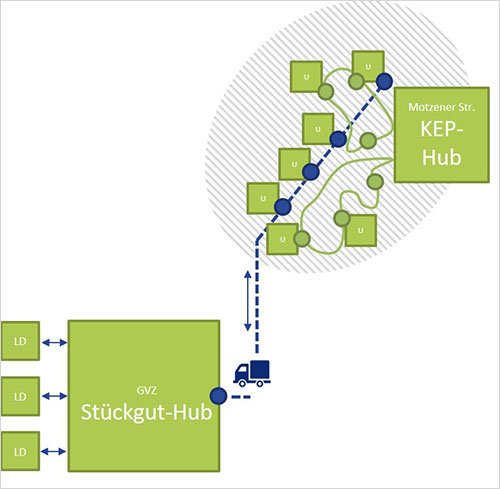
In the summer of 2020, a consortium from Berlin and Brandenburg commissions a study on business development between the Großbeeren freight center and the nearby Motzener Straße urban industrial and commercial area. In one of the first intermunicipal projects of the joint state planning (GL), LNC LogisticNetwork Consultants GmbH and LaLog LandLogistik GmbH are commissioned, arrive at exciting results and develop two forward-looking concept ideas.
As the crow flies, only six kilometers separate the two locations. But in reality, a national border still showing the scars of German division and an evolved transport infrastructure influenced by it with restrictions for today's commercial traffic lie in between. How can delivery traffic between the GVZ Großbeeren (Brandenburg) and the Motzener Straße industrial park (southern Berlin) be optimized?
In order to answer this key question, LNC and LaLog are for the first time conducting extensive surveys of the companies located in Berlin's southernmost industrial area and in the most successful eastern German freight traffic center.
About 22% of the general cargo traffic of the industrial and commercial area Motzener Straße is handled directly via the nearby GVZ. Although more than 70% of the manufacturing companies say they receive deliveries and ship goods several times a day, more than 40% of the companies surveyed say they do not receive any goods via the showcase logistics location on the Brandenburg side. Some companies also do not even know exactly how the supply chains work in practice.
This is a surprising result only at first glance, because for various logistics service providers involved, the freight traffic center is only a HUB in the region. This means that transports via the Motzener Strasse industrial park may have a different starting or end point because the logistics partners involved operate several locations.
However, the project team can prove that with more than 900 pallets per day in reception and dispatch, the economic basis for the establishment of a general cargo HUB at the Großbeeren site is available. The relationship offers a great deal of potential for optimization, which could even serve as a model for other locations.
As a recommendation, LNC and LaLog are developing a multi-stage implementation concept for a "general cargo shuttle" with an ecologically effective drive system in short-haul traffic that can not only bundle and reduce traffic, but at the same time have a positive impact on pollutant levels and acceptance among residents.
In addition, the survey reveals a need for action in the courier, express and parcel services (CEP) sector. Many delivery vehicles in and around the business park cause a high volume of traffic. This can be remedied by a micro HUB that, in an expansion stage, not only bundles CEP traffic and relieves delivery routes through the use of environmentally friendly cargo bikes, but also benefits tradespeople and residents alike and can even integrate other value-added services that benefit companies, their employees and logistics service providers alike.
Conclusion of the feasibility study: There is great potential to develop the relationship between the two locations. With the present implementation proposals, the project sponsors can take the next step. Interest in and support for the projects has also been aroused on the part of business representatives.
If you have any questions about the project, please contact:
Michael Kuchenbecker
Tel.: +49 30 58 58 4 58- 01
E-Mail: mk@lnc-berlin.de
